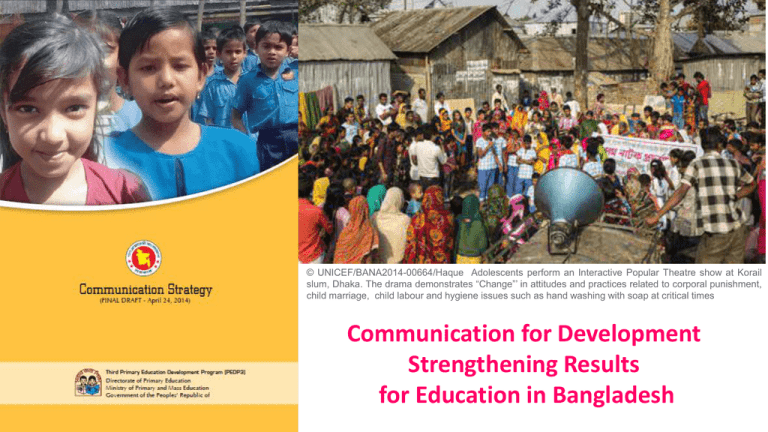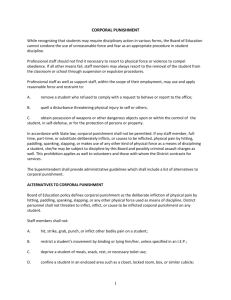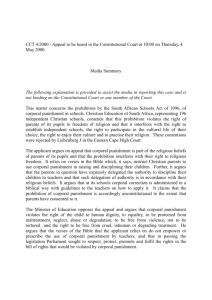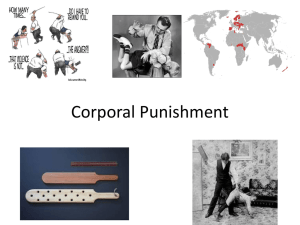File
advertisement

© UNICEF/BANA2014-00664/Haque Adolescents perform an Interactive Popular Theatre show at Korail slum, Dhaka. The drama demonstrates “Change”’ in attitudes and practices related to corporal punishment, child marriage, child labour and hygiene issues such as hand washing with soap at critical times Communication for Development Strengthening Results for Education in Bangladesh Process • Formative research & MORES • Literature review – what worked for UNGEI • Consultations cum workshops (4) with education personnel at different levels • Consultations with DPE officials • Draft on web for review and input • Consultation towards finalization involving donors and CSOs • Ministry review • JERM review and endorsement • Ministry for final approval Workshop photo Level (SEM ) Deprivations/Bottlenecks Interventions/ Actions Individual Loss of investment in girls; Low belief in the value of education ; poverty and pressure to withdraw boys for income generation; Mandate to teachers for corporal discipline of children; Analysis of functions, skills, training & tools; Communitybased promoters/ counsellors trained in IPC, participatory skills and intervention content promotion; provided with tools and IEC materials Family Provides no emotional support (due to lack of knowledge and socio-cultural values & beliefs); not actively persuaded to adopt and support appropriate behaviours Special sessions for men, and courtyard meetings to involve mothers-in-law so that family members are persuaded to adopt and support appropriate behaviours Community Enforces compliance to social rules of the game – child marriage; Eve teasing- harassment of girls tolerated; organized marriage for poor orphans Ward Development [Child Welfare] Committees holding community dialogues to create an enabling environment for practice of new behaviours and promote new standards Institutional Issues of access especially to secondary schools, poor infrastructure; Inadequate skilled teachers and other factors that do not motivate sustained use of services Capacity to generate and use data; Tools, guidelines & materials available to IEC unit IEC unit & other partners that contribute to achievement of sectoral goals 3 C4D for PEDP-3: Planned Outcomes by 2017 GOB/MOPME use research, monitoring & evaluation data to support the planning and implementation of C4D interventions Key social networks and select community structures facilitate discourse and promote changes in (2) social norms (child marriage and corporal punishment) 60% of caregivers in select upazillas in 20 most deprived districts report the practice of 4 education friendly behaviours (early enrollment; completion of P/E; no abuse physically or mentally; no child marriage) High level advocacy • Public declaration by Prime Minister to basic quality Education • GoB establishment of IEC Unit to support implementation of strategy Community Engagement • Dialogue fora by Ward Development Committees to influence mutual expectations • Engage Islamic Foundation, local prayer, local Khutbas , networks, local indigenous institutions in facilitating peer group dialogues • Public declaration and making commitments to new social rule manifest, clear to others; Supporting social norms change Adolescents and Youths as Change Agents • Promoting commitment to a new vision that improves QOL for children and the society. • Towards collective manifestation of commitment Mass Mobilization • Public, private , voluntary, not-for-profit sectors • Vocational and Academic institutions; Bangladesh News Agency; BNNRC Intensive Multi-Media Campaign To prepare the ground; discuss benefits of establishing or changing a social norm; bring-in information that questions the behaviour and of each other; towards attaining common knowledge ; materials produced in different formats used to stimulate dialogue A Social Movement for Social Norm Change & Quality Basic Education Meena day hosted by Government Comic Books Film shows in schools Community drama – Enter Educate Ami Meena Bolchi on radio BTV Building on Existing Foundations Paradigm Shift in Partnerships for Social Change • Schools facilitating classroom session on interactive game on harmful social norms • Community Influential promoting good parenting skills Linking SMC with other service providers and local networks; HPN rep Rep of vulnerable SMC rep Snr religious Leader • Adolescents facilitating open theatre and discourse • Mass media mobile film shows in schools CBCPC Rep Ward Development Committee Rep of cultural group WASH Committee Female Leader (of local social network) Youth Rep CCMG member Generating Demand for Education Meena Comic Book Poster for DPE on Autism Bill board on 78 Episode BTV drama on Out of School Children Documentary CD on Out of School Children Adolescent Radio Listeners Club Poster on drowning Since 2012 1.78 episode TV drama and 78 episode Radio drama on out-of-school children 2.Two Meena Animation film on Autism and Out of School Children 3.6 spots on working children and Education 4.Meena autism – poster and docudrama 5.Documenting PEDP-3 activities & results 6.IPT scripts (child marriage, corporal punishment, child labour) Capacity Strengthening • • Trained Multi-generational IPT Groups IPT Scripts on Education • • Training IPT teams in all 64 districts PEDP-3 Com Strategy Community engagement training module IPT training module Update of micro-planning guidelines IPT Training Manual • Software for standardization and Quality of data Framework • Performance and process Monitoring in sentinel sites • Result monitoring in sentinel and control sites • Use of information technology (software) Strategies Methods • Baseline Study • Result based monitoring in each six months • Quantitativ e Component (survey) • Qualitative Component (FGD, MSC, IDI, KI) Process • Capacity Building • Baseline Study • Midline Study • End line Study Evidence Generation for Policy Advocacy Knowledge Level on Corporal Punishment 77% 80% 60% 53% 46% 50% 38% 50% Good 33% 30% 27% 62% 61% 60% 45% 40% 30% 67% 70% 29% 29% 26% 24% Good Average 40% 27% 26% 30% 20% 20% Average Poor 20% Poor 20% 30% 13% 10% 6% 3% 8% 10% 0% Under 6 months Mother 0% Under 6 months Mother Under 5 yrs Mother Adult Male Adolescents Sentinel Sites In partnership with James P Grant School of Public Health, BRAC University, a results framework, quantitative, qualitative , and MSC tools developed; sentinel and control sites profiled, baseline data collected. Under 5 yrs Mother Adult Male Adolescents Control Sites Mass media complimented by intensive IPC accelerates understanding, generates new attitudes and commitments to new child friendly standards Documenting Most Significant Change Stories Korail, Dhaka, February 2014. Monu’ was the stage name of 12-year old Anwar who played the lead role in that day ’ s interactive popular theatre show in front of makeshift dwellings in densely populated Korail slum of Dhaka. The audience watched as Monu got in trouble at school because he did not have his homework. He was sent to the corner, where he had to pull his own ears in punishment in front of his classmates. At home, his father beat him. Monu was sent to the stone crusher mill for work, where he also made mistakes and was punished yet again. A supportive teacher then discussed harmful effects of corporal punishment with Monu’s parents. The teacher explained that assaulting children breached their right to protection and violated their dignity; it made children feel depressed, resentful and it undermined their self confidence. The audience observed as eventually the father agreed and sent his son back to school to finish his basic education. At the end of the performance, the young actors engaged the adults in the audience in a Anwar commented: “Beating children is bad. It makes you feel ashamed in front of those who see you being beaten. It also makes room for your peers to tease and bully you. And it hurts.” Lessons Learned & Way Forward • Investing in a thorough process of consultations cum capacity development creates the enabling environment for adoption and mainstreaming of new approaches to address norms and other barriers to education. • Multi-tiered process of consultation enhances process of ownership of sector officials from school management committee and teachers at community level, thru district education officials to senior education officials • Careful documentation of best practices, innovations and lessons learned are very useful advocacy tools for GoB and partners to leverage internal and external resources Dhonnobad




